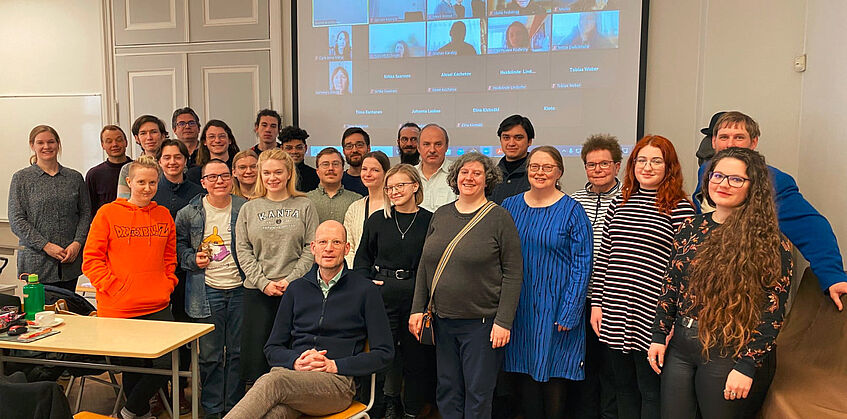REMODUS Spring School 2022
The 2022 Spring School of Finno-Ugric Studies was held at the University of Tartu between 4 and 9 April 2022. It consisted of an Old Komi language course, a workshop on genetics, linguistics & prehistory, and a number of thematic lectures. The spring school was a hybrid teaching event: students can participate in person, or over the Internet.
| Mon 4 | Tue 5 | Wed 6 | Thu 7 | Fri 8 | Sat 9 |
9:30–11 | Old Komi | Old Komi | Old Komi | Old Komi | Old Komi | Colloquium |
11–11:30 | Break | Break | Break | Break | Break | Break |
11:30–13 | Old Komi | Old Komi | Old Komi | Old Komi | Colloquium | Colloquium |
13–14:30 | Lunch | Lunch | Lunch | Lunch | Lunch | Break 30 min 13:30– Excursion |
14:30–16 | WS: Intro-duction | WS: Uratyp and clustering analysis | WS: Basics of R II | Lecture: Maps: URHIA | WS: Map making II | |
16–16:30 | Break | Break | Break | Break | Break | |
16:30–18 | Lecture: Kristiina Tambets | WS: Basics of R I | Basics of R III | WS: Map making I | WS: Map making III |
|
Evening |
| Board meeting |
|
| Diner |
Language course: Old Komi (Gerson Klumpp, University of Tartu)
In this course students get acquainted with Europe’s most north-eastern literary language developed in the course of Christianization and one of the earliest literacies among the Uralic languages. Developed by the later bishop of Perm Stepan, the Abur script is a writing system which was created specifically for liturgy in Komi in the 14th century. While the bulk of the Old Komi corpus is in Cyrillic, the Abur script plays an important role in terms of identity. The course introduces the historical and religious background of the Old Komi literary tradition, the Abur script and its background, the Komi variety which formed the base of the literary tradition, as well as lexical, morphological and syntactic characteristics on the basis of the preserved text corpus. The course is a unique opportunity for the students to familiarize themselves with a literary language with an old tradition which does not have a national language status.
Workshop: Genetics, Linguistics & Prehistory (Outi Vesakoski, Meeli Roose, Timo Rantanen – University of Turku; Michael Dunn, Yingqi Jing; Miina Norvik – University of Uppsala; Kristiina Tambets – University of Tartu)
The aim of the workshop is to make students with a linguistic profile more acquainted with the research methods of genetics; this is also a logical outcome of the long history of linguistics and biology (and related fields) borrowing each other’s methods. The focus is on the prehistory of Finno-Ugric peoples, settlement areas and changes occurring in these areas (Estonia, Finland, Northwest Russia) which can be connected to linguistic development. Quite some results which bring together paleolinguistic and paleogenetic data have been achieved in recent years, but for a proper understanding of the result prerequisites are often missing. The workshop particularly aims at paving the way for such an understanding and pointing out research possibilities. The workshop will also involve a wide range of practical transdisciplinary exercises. The workshop consist of the following parts:
– Introduction (UraHoli-type of Uralic interdisciplinary study) by Outi Vesakoski
– Lecture on genetics in interdiscicplinary studies by Kristiina Tambets
– UraTyp data, introduction and R-tutorials by Michael Dunn, Yingqi Jing, Miina Norvik
– Map making workshop, GIS data handling, by Meeli Roose, Timo Rantanen
Colloquium: Participants present their graduate theses (work in progress)
Venue: Tartu, Ülikooli 18, PH139 (Veski auditoorium) & Zoom (links will be provided later)

